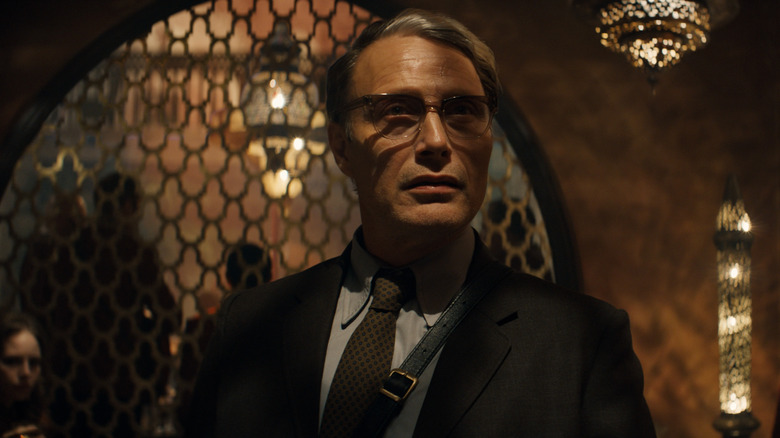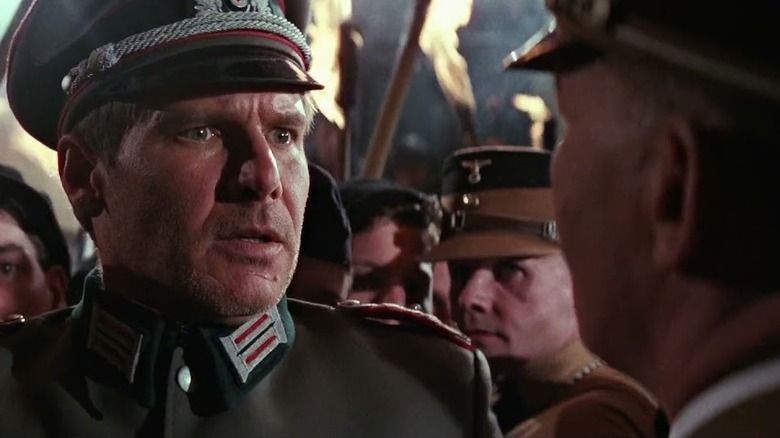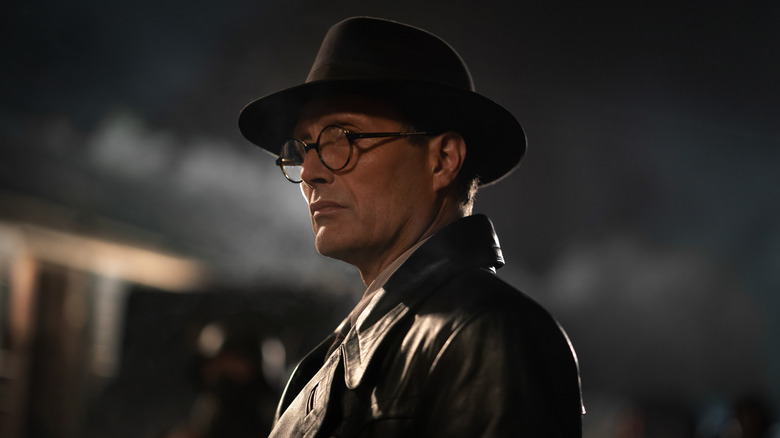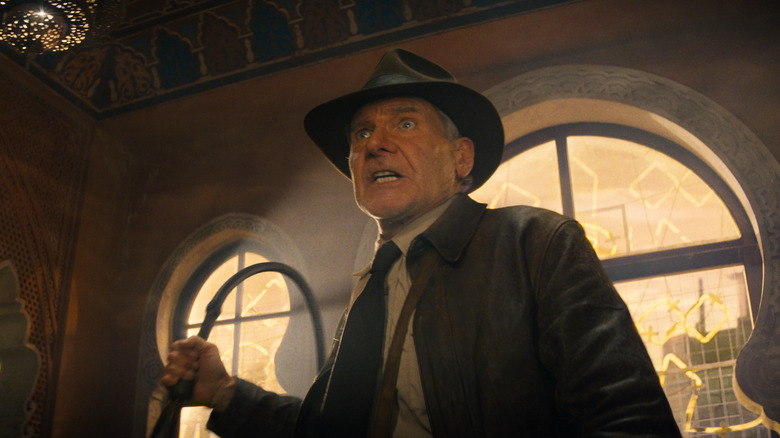Indiana Jones And The Dial Of Destiny Brilliantly Subverts A Classic Genre Cliche
This piece contains massive spoilers for "Indiana Jones and the Dial of Destiny."
In a way, sequels are a form of time travel. Sure, business-wise they're greenlit by studios as a way of minimizing risk to get maximum financial reward. But on the creative side, they provide filmmakers the ability to give an audience an experience as paradoxical as the concept of time travel: something similar but different. In some cases, the opportunity of a sequel can feel like a writer, director, or cast member being given a second chance at history; to borrow a phrase, they can put right what once, in their minds, went wrong.
The best sequels are those that slyly subvert expectations and sneak in a thrilling new experience under the guise of providing a well-worn one. Director James Mangold and his team have done that with "Indiana Jones and the Dial of Destiny," a sequel and concluding chapter to the "Indiana Jones" saga that begins by providing all the required ingredients for a great Indy film: Harrison Ford, a brassy leading lady, a kid sidekick, evil Nazi villains, and a mysterious historical artifact that they're all after. But slowly the movie deepens, enriches, and twists all of them, so that by the end, the film feels like it's own adventure rather than a re-hashed one.
Perhaps the most clever subversion in the film is one that passes by rather quickly: after this movie's baddie, Jürgen Voller (Mads Mikkelsen), finally obtains the reconstructed Antikythera (aka Archimedes' titular Dial of Destiny) which is rumored to point the user toward "fissures" in time, the former Nazi reveals to a captive Indiana Jones that he intends to use the fissure to travel back to 1939 and...kill Adolf Hitler. It's a bold statement that not only solidifies the character of Voller, but adds to the wealth of surprises and depth within "Dial of Destiny."
Let's kill Hitler
The concept of going back in time and killing Hitler has only grown in popularity during the 78 years since World War II ended for reasons obvious and not so obvious. As to the former, the Holocaust perpetrated by the leader of the Nazis is easily one of the most atrocious acts ever committed, and because it's assumed that Hitler's removal from history before he's allowed to come to power would save at least six million lives (if not more, given the war casualties themselves), the concept is tantalizing from both a moral and historical perspective.
The notion has grown in conjunction with the increase in genre fiction ever since the end of WWII; while science-fiction, horror, and fantasy certainly existed prior to the 1940s, they only grew in popularity in the decades that followed. As speculative fiction went mainstream and the idea of time travel became popularized thanks to everything from "The Time Machine" to "The Twilight Zone," "Back to the Future," "Quantum Leap" and more, the idea of killing Hitler (whether or not he's a baby at the time one encounters him) became so prevalent that not only have multiple shows, films, novels and other forms of fiction tackled the concept, but the question has become a popular ethical conundrum.
The trope of killing Hitler has been around long enough now that audiences are comfortable with further variations on it. To name just two examples, there's 2008's "Valkyrie," which dramatizes a historical failed attempt to assassinate Hitler during the war, and 2009's "Inglourious Basterds," which sees Quentin Tarantino begin his loose "alternative history" trilogy by having his Jewish commandos go ahead and blow Adolf to bits during the climax.
Indiana Jones and the Problem With Hitler
Ironically, "Dial of Destiny" is not the first instance of the "Indiana Jones" films dealing with the head of the Nazis. In "Indiana Jones and the Last Crusade," the intrepid archeologist actually meets Hitler (Michael Sheard) face-to-face when he's trying to retrieve an important diary from a Nazi book-burning party. Thanks to being in disguise as a German soldier, Indy can only watch helplessly as the Führer signs his name on Indiana's dad's book about Holy Grail legend.
Not only is the moment a bit of historical fiction, with our Nazi-punching hero coming into contact with the Nazi-in-Chief, it's laden with irony given that Indy's in a position where it's impossible for him to take Hitler out. If only he wasn't surrounded by Nazi soldiers in the heart of Berlin, the moment seems to imply, this could've all ended differently and sooner.
Thanks to the "Indiana Jones" series being a fictional adventure story set in real-life historical periods, there's only so much the storytellers can do without going full Tarantino and changing historical facts so the hero can defeat his ultimate villain. To put it in co-creator George Lucas terms, it's as if "Star Wars" had to avoid Luke ever battling Darth Vader.
Anything he can do, I can do better
Since the concluding chapter of the "Indy" series cannot feature Indiana punching Hitler in the chops, Captain America-style, "DIal of Destiny" does the next best thing and gives Indy a would-be replacement Hitler to thwack instead.
"Dial" is a film about complicated legacies, where middle-aged (or older) men look back at not just their lives but history as a whole and wonder if they couldn't have done — or still can do — more to change it. While Indiana mulls that problem over when it comes to his family and the like, Voller finds himself working for the U.S. government, guiding his once-enemy country to a spiritual and technological victory by working on the Apollo 11 space shuttle that brought the USA to the moon. That plot point is a clever nod to the odious real-life Operation/Project Paperclip, in which ex-Nazi scientists, such as former SS officer Wernher von Braun, were given amnesty in America in return for their services.
From his first appearance in the film, it's clear that Voller is a haughty, prideful, and intelligent man, though his motives are a little mysterious: he demonstrates a good deal of frustration with the Nazi officers he's forced to deal with while Indiana and Basil Shaw (Toby Jones) steal the Antikythera, but later in 1969, he makes a point of looking sour during a parade celebrating the moon landing, telling a poor hotel waiter that America "did not win the war...Hitler lost it."
Upon his announcement that his goal is to use the Dial to go back in time and murder Hitler only to take his place, Voller's character finally solidifies, marking him as not just arrogant and ambitious but potentially more dangerous and maniacal than Hitler had been.
He's alive
Voller's ambition to out-Hitler Hitler cleverly subverts the old proverb "the enemy of my enemy is my friend," the character's aims going beyond Indy's (and our) desire to wipe Hitler off the face of history to discover that there's someone potentially worse lying in wait. The moment is a perfect encapsulation of one of the most common refutations to the "go back and kill baby Hitler" thought exercise, which is: no matter what, such a person will arise and become a problem.
"Dial of Destiny" subtly and not-so-subtly uses Voller and the themes of the movie to comment on the state of the world in 2023. Over the last several years, especially during the Trump presidency, many philosophers and historians (amateur or not) have compared events to that of the late 1960s. While "Dial" uses its 1969 setting to make a direct comparison between Voller's goals and the recurring scourge of Nazism in the 2010s and '20s, it also subtly posits the idea that there are eras of history that act as fulcrums, where certain events are destined to occur.
In conjunction with those pivotal events is the notion that people like Indiana Jones must be present and must act in order to provide balance and stop the worst from coming to fruition. After all, Voller's ultimate fate, left for dead in a place some 2,000 years before his birth, would not have happened if Indy hadn't been there to help make it happen.
The problem with Hitler in particular and Nazism in general can feel like a never-ending game of whack-a-mole, with organized hatred and bigotry springing up like weeds in a garden. "Dial of Destiny" both acknowledges that fact as well as provides a salve for it: as long as people like Indiana Jones are where they need to be at the right time, we won't have to make up another thought experiment about killing a new Hitler.




